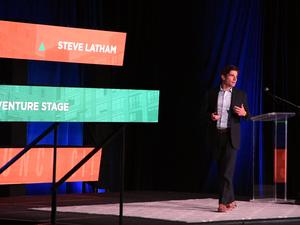
Organizers of the 2020 Venture Atlanta Live Online conference ramped up production for its online-only debut on Oct. 21 and 22, and it did not disappoint.
The conference, one of the hottest in the city for startup founders to connect with investors, combined live-streamed panels, prerecorded presentations and small Zoom rooms to mimic the dynamics of the typical, in-person conference.
Not only did Venture Atlanta CEO Allyson Eman say it went better than expected with about 1,200 attendees, startup founders said the virtual platform allowed them to network more efficiently than running around a conference hall trying to find someone before the break ends.
The two-day conference included more than 250 investors attending and 103 companies pitching, Eman said. Here are some of the biggest takeaways from the virtual event.
High production for the pajama conference
The 13th-annual Venture Atlanta conference was business from the waist up. But just because the participants may have gone without getting dressed-up, there was nothing casual about the production quality of the conference.
It’s fitting for a tech conference to master the virtual conference platform.
After attendees registered, they gained access to the Venture Atlanta platform that had all events and company and sponsor information in one place. An interactive agenda allowed attendees to create their own schedules, which included live panels, breakout chats about specific topics, company Zoom rooms and an option to create one-on-one meetings.
“Building out the virtual platform was definitely challenging and wasn’t perfect, but I think once everyone got on, they got into it,” Eman said.
The hosts and panelists stood or sat — socially distanced — on a sleek stage with killer camera angles and video quality. There were no noticeable technical issues or lags with the streaming, and people in the chat continuously complimented the quality of the conference.
Founders either used the stage to pitch their companies or created a prerecorded, remote video pitch. During pitching rounds, the conference organizers seamlessly switched between live and remote content.
Some presenters said they had to create more materials for their pitches to captivate a virtual audience and flow with the conference’s formatting.
All the sessions will be available Monday, Oct. 26, for up to a year, so attendees can go back and watch what they missed. Founders and investors can continue to use the platform to have private meetings until Nov. 13.
Quicker connections
Some founders preferred the ease of the virtual conference because it allowed for more multitasking, visibility and quicker networking opportunities.
Bogdan Constantin, founder of Atlanta-based text-commerce company Voxie, said he didn’t miss the in-person joys of spending half of a conference chasing down a quiet room or stressing to find someone.
“The fact that we could have these really quick Zoom meetings and knock them out instantly to establish interest of the next step or not was extremely powerful,” Constantin said.
After his pitch presentation for Voxie, Constantin said he had investors reaching out from all over the country, which he partly attributed to the increased visibility a virtual platform allowed.
Dana Weeks, CEO of Atlanta-based medtech company MedTrans Go, agreed that there was less time wasted. She said she could have her virtual company “booth” open for interested attendees but also watch the live sessions when she wasn’t meeting with people. The extended timeframe for meetings is also a plus as attendees sort through the many pitches.
As we move into next year and hopefully out of the pandemic, it’ll be interesting to see if any companies emerge to create a hybrid conference experience that gives the best of both worlds.
COVID-19 pivot
The pandemic may not have popped up in every pitch, but many presenters mentioned how their companies coped, pivoted or thrived because of it.
Of the about 20 Atlanta-based companies that pitched at the conference, four of them were medtech and discussed how they have incorporated the booming telemedicine industry into their companies.
Weeks of MedTrans Go said her B2B company tries to solve for cancellation in healthcare appointments, specifically because of transportation and interpretation, which she said are the two biggest reasons for people to cancel.
The company added prescription delivery options and video appointments to adjust to patient needs during the pandemic. The video service, originally designed to interpret for American Sign Language patients, was redeveloped to allow for healthcare providers to have telemedicine appointments with their patients. The company also has interpretations available for more than 100 other languages, Weeks said.
“We were kind of designed to have that flexibility, but we really did begin to pivot just when the pandemic happened,” said Weeks, who noted the company saw growth over the spring and summer with those new features.
Aaron Petty, founder of Atlanta-based company Mitivate, which aims to eliminate financial inefficiencies in the healthcare ecosystem, said the company also pivoted to evaluate telehealth visits.
“We have had to really look at telehealth and make sure that they met the minimum quality based on the patient’s conditions,” Petty said. “There was a lot of different things we had to reroute but everything went pretty smoothly.”
Not the ‘Silicon Valley of the South’
It’s pronounced At-lant-a. At least that’s what Techstars Managing Director Barry Givens and Russell Center for Innovation and Entrepreneurship CEO Jay Bailey stressed during a session titled “Building a Unique and Powerful Innovation Ecosystem.”
The formula for Atlanta’s innovation ecosystem to thrive does not come from copying Silicon Valley or any other city, the panelists said, but rather from the city's homegrown assets — namely, diversity and affordability.
Bailey said Atlanta is a prime spot for diverse founders to gain confidence because of the city’s inclusiveness.
Givens said Techstars has been investing in companies that have a social justice goal, such as Civic Dinners, an Atlanta-based company that facilitates small-group conversations within companies or other organizations about diversity and inclusion.
“If we invest in things that matter, our city is not going to be the next Silicon Valley,” Givens said. “It’s going to be the first Atlanta.”
Duriya Farooqui, board director of the Intercontinental Exchange, said investing in diverse entrepreneurs and startups is a business and civic imperative.
The metrics that value the success of startups early on are biased, Farooqui said. For example, an entrepreneur may not have the connections to wealthy people to raise funds through a family and friends round.
Besides, Bailey said, innovation comes from working with what you have, and Atlanta is a city still “affordable enough to dream.”
“Find me someone with more innovation on the planet than a single mother with two kids making $17,000 a year,” Bailey said.
Pair affordability and diversity with the Fortune 100 companies headquartered in Atlanta, and the recipe for growing the innovation ecosystem is complete.






